
As the late afternoon sun crept through the glass windows of the intimate Bieberbach-Reed Room, a small group of students gathered in a town hall-style discussion about the six amendments on Florida’s ballot this year.
In celebration of National Vote Early Day on Tuesday, October 29, Rollins College’s Democracy Project hosted a dinnertime dialogue to educate students about what they will be voting on this election season.
The event featured Keisha Mulfort, a Senior Communications Strategist at the American Civil Liberties Union of Florida, Katherine Perriel, a Senior Organizer with the ACLU of Florida, and Daniel Elliott (‘23), the District Aide to House Representative Susan Plasencia, as speakers. The speakers presented both sides of the issues being voted on, upholding Democracy Project’s commitment as a nonpartisan organization.
Florida’s ballot this year may feel like a bit of an exam for some voters with 4 pages worth of reading. Mulfort assured students that the exam is an “open-book test,” and the state provides a “study guide” in the form of a sample ballot to prepare them for when they enter the voting booth.
For each of the amendments, moderator Evan Link (‘25) read out the official legal text for the proposals, with speakers Mulfort and Elliott acting as translators for the legal jargon.
The first amendment proposes that district school boards be made into partisan elections starting in 2026.
“When you’re making decisions for a school board and for thousands of students, your political affiliation should not matter,” said Perriel, expressing the sentiment of opponents of the bill.
“As a former educator who was actually on the receiving end of what that looks like, it looks like book bans,” said Mulfort. “It looks like implementation of things that are detrimental, in my opinion, to students.”
Mulfort, who taught for over 10 years at Edgewater High School, was particularly worried about the rise of censorship in schools worsening with partisan elections.
Elliott provided insight into what proponents of Amendment I may argue, expressing that these decisions, like book bans, will occur whether or not the election is partisan.
“The decisions are still going to be the same, but voters will now have a better idea and more transparency on what kind of people they’re electing in the office,” said Elliott. After both sides were able to present their cases, the discussion shifted to the next amendment.
Amendment II proposes that the right to fish and hunt be made a constitutional right. It is important to note that this would not infringe on the Florida Fish and Wildlife Conservation Commission‘s authority.
Voting yes on this bill would make it more difficult for the legislature to impose restrictions on types of hunting or fishing. “Further, an affirmative vote would support hunting and fishing as a primary way to manage wildlife, where citizens’ hunting and fishing keeps animal populations at desirable levels,” said Mulfort.
Many conservationists still worry about this bill limiting conservation efforts.
Discussion amongst the crowd really began to ignite when they reached Amendments III and IV. These citizen-led initiatives have received the most funding out of all of the proposed bills.
Amendment III seeks to legalize the recreational use of marijuana for adults over 21.
“The proposal would also remove criminal or civil penalties for adults over 21 who possess and use up to 3 ounces of cannabis for personal use,” said Mulfort.
Opponents of Amendment III argue that the legalization of marijuana will create a monopoly in companies selling cannabis and related products.
Perhaps the most controversial of the six amendments is Amendment IV, concerning the topic of abortion and reproductive rights.
The matter is one that is largely related to personal opinions on the morality of abortion and if the government can be involved in personal medical decisions.
“Whether you support abortion or that particular law or not, opponents of the law say that if you think that the six week ban right now is extreme, this amendment could potentially be extreme as well because of the way it’s written,” said Elliott. “It could provide for the right to abortion up to birth, and it eliminates parental consent.”
Mulfort and Perriel both shared their own connections to the issue and emphasized the ACLU’s support of the Amendment.
“In the state of Florida, women are dying because they do not have adequate access to abortion,” said Mulfort.
Amendment V proposes an increase in exemptions from property taxes in response to inflation.
Current property taxes are broken into two sections: funding school districts and funding the local government. Homeowners can get an exemption equivalent to $25,000 for each of those taxes. The current ballot measure would overturn the Save Our Homes Act and increase the exemption value.
“One stipulation in that ballot measure is that it only affects the local government rate. So whatever decisions voters make on this measure are not going to affect the school districts,” said Elliott.
Opponents to Amendment V express concern over defunding local governments, and in turn, the services they provide.
Amendment VI, the final amendment on the ballot outside of county-specific charters, proposes the elimination of public funding for campaigning.
Proponents of the bill argue against tax dollars going to candidates that may not represent everyone’s interests and instead allowing that funding to support more public services. Opponents worry over the lack of limits on special interest groups and wealthy donors as well as limiting access to less wealthy candidates, in turn limiting diversity.
An amendment in Florida may only be passed with a 60 percent approval rate, so Mulfort and Elliott urged students to go out and vote.
“I encourage people to vote for everything on the ballot, not just vote for it, but do your research well before,” said Elliott. “I think it’s important, more than voting, to be an educated voter. So, think for yourself, and get all the facts before you vote.”
For further breakdowns of the six Amendments, check out the League of Women Voters of Orange County and the James Madison Institute.


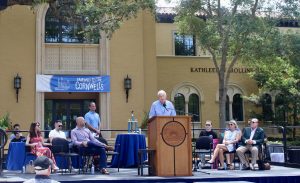

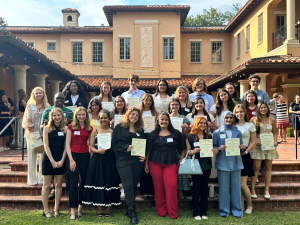
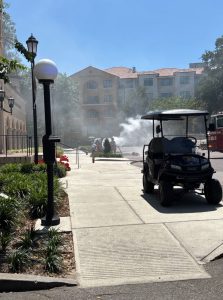

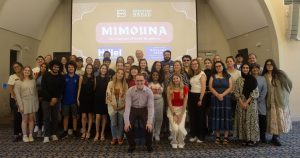


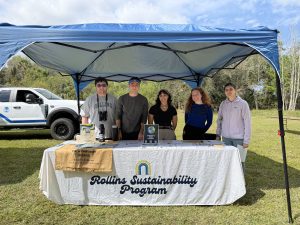
Comments are closed.